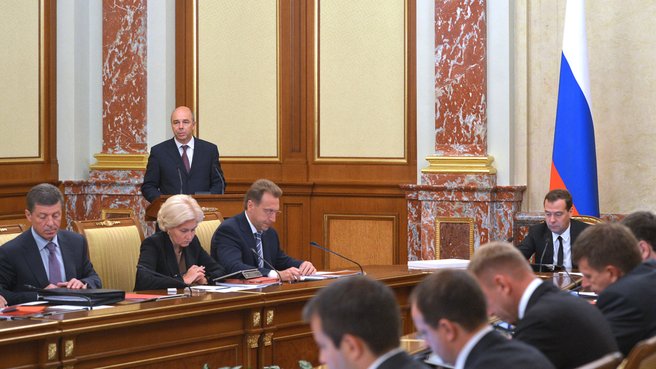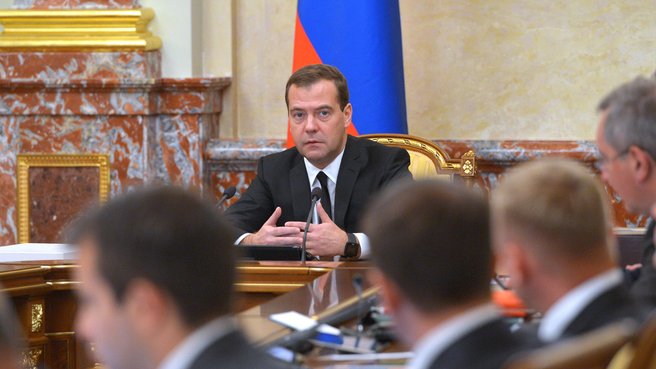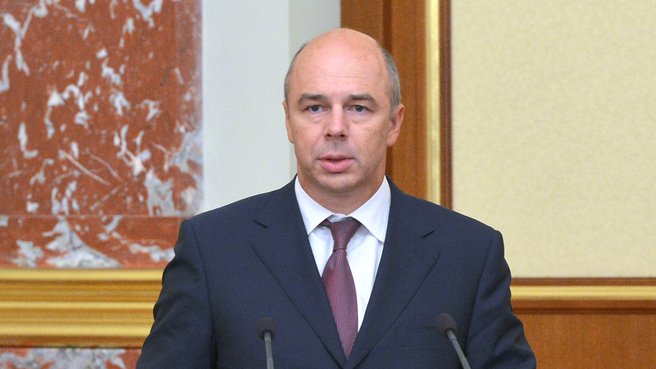Agenda: Executing the federal budget, fulfilling federal targeted programmes and the Federal Targeted Investment Programme in the first half of 2013, as well as 12 other issues
Dmitry Medvedev’s opening address
Transcript:
Dmitry Medvedev: Colleagues, our agenda today includes an unusually large number of issues, the most important of which is the execution of the budget and the fulfilment of federal targeted programmes and the Federal Targeted Investment Programme.
This is a very important issue because the speed and quality of economic growth in the country and the modernisation of the social sphere, healthcare and education depend on these instruments working effectively. Also related to this issue are changes in the structural proportions of our economy and a balanced development of the regions.
Dmitry Medvedev: Now, about the budget: we did quite well in the first half of the year, and even better than was predicted in some areas. For example, the federal budget surplus has almost reached 1.2% of gross domestic product, which is more than in the same period of last year – around 370 billion roubles.
Now, about the budget: we did quite well in the first half of the year, and even better than was predicted in some areas. For example, the federal budget surplus has almost reached 1.2% of gross domestic product, which is more than in the same period of last year – around 370 billion roubles.
The structure of budget revenues is gradually changing, although not as quickly as we would like. The budget and the financial system are becoming better protected, I hope, against market fluctuations. According to the first half-year results, the share of non-oil and gas revenues exceeded 50% of the total, or more precisely 50.5%. It was 48% last year, so we are seeing positive change, albeit a small one. I’d like to point out that this is happening amid a very complex state of the global economy and in spite of slowing economic growth in Russia.
Preserving and promoting positive trends is one of the Government's key priorities, of course; we discussed this at our meeting on July 4 as we were considering budget policy guidelines for the next three years. The new three-year draft budget, which is to be submitted to parliament in October, is also oriented toward that goal.
Work on the draft budget has entered its final stage now. And it is already clear that this new budget has a whole number of special aspects: First of all, given the current circumstances, including high volatility on major world markets, the sluggishness of the domestic economy and the economic downturn faced by many other countries, we'll have to operate within certain limits. According to Russian Economic Ministry forecasts, external demand is likely to shrink further. Although some predict that next year, the world economy – Europe's in particular – will be somewhat reinvigorated, showing an opposite trend.
In accordance with our predictions, there are serious risks related primarily to the possible deterioration of the financial state of Russian companies and a slowdown of their investment activity. It's clear that we won't have any money to burn in such circumstances. So we'll have to reduce expenditure accordingly.
Therefore, we’ll have to make extensive reductions of under 5% across the expenditure budget with the exception of the secured budget items. In some cases, the reductions may be higher and I have a request for all my colleagues and all ministers present here to work together on this issue and go beyond the interests of their agencies. We only have one budget.
Secondly, the federal budget was based on the state programmes. The same approach – building on the targeted programmes – must be applied to regional and municipal budgets. I should mention here that it must not be a mere combination of several different programmes. We must focus on a different objective, which is improving financial management.
The third, and a very important idea, is to streamline and improve the efficiency of the budget expenditure. This will require refining the state procurement system, along with strict compliance with the conditions of the federal programmes. I will remind you that we will be carrying out three major infrastructure projects funded by the National Wealth Fund. The main condition is, of course, that they eventually bring economic benefits, create a multiplier effect and become self-sufficient.
And one more thing. It is vital to impose tougher control over related costs that have grown significantly lately. While it can be explained in the context of economic growth, it is unacceptable during the recession. I think this is obvious. The Government, therefore, proposes making adjustments to the increase in rates of infrastructure monopolies and refraining from increasing them in 2014 and later, in 2015-2016, lifting them according to inflation rates. This will not be an easy decision and it will require concerted action. However, the decision must not affect the investment plans of the infrastructure monopolies. They must look for sources, and I suggest that the Government support them where possible.
We discussed this with you at previous meetings and at a meeting with the President. I will get back to these issues at a meeting with my deputies and heads of economic agencies. The Government Commission on Budgetary Planning is planning a final meeting next week. Please consider the suggestions and instructions that I’ve just mentioned in your work.
Now I will speak briefly about the federal targeted programmes and the Federal Targeted Investment Programme. I will not go into much detail, as the ministers will give thorough reports later, but there are a few points I would like to pause on. Unfortunately, the funds allocated are spent very slowly, and this remains a long-term issue that has not been successfully handled as of yet. Currently, spending amounts to only a quarter of planned annual funding. I held a meeting where various measures were proposed to change the situation. I would like us to return to the results of this meeting, including economic and disciplinary matters.
Second, low co-financing levels which currently make up just about one-third of the planned amounts. Understandably, the situation is difficult, but nevertheless it cannot be tolerated. We should rectify this situation and make use of the regional and local budgets which are not in their best shape, either, in order to implement federal targeted programmes. Therefore, we should provide incentives to private and institutional investors, as well as development institutions.
Finally, we should expedite the drafting of targeted programmes which will be launched next year. The programmes should be submitted to the Government soon. Specialised departments and the Government Executive Office should see to it that these documents are submitted on time. We will discuss all this, and we will allow our colleagues representing the expert community to speak on the subject. I would also like to single out one more aspect, which is also understandably important – the situation in Russia’s Far East and the establishment of the major Government Commission on the Socioeconomic Development of the Russian Far East. I would like to stress that this concerns the development of the entire region, not clean-up operations after this calamity. However, both aspects are, of course, interdependent. Just like in the case of the North Caucasus, I will personally oversee the work of the relevant commission, because the region has become the focus of attention, especially now that the situation is extremely difficult.
The Minister who was appointed yesterday and Deputy Prime Minister YuryTrutnev are currently visiting the region, or at least should be there, in order to address the situation. They will come back next week and report on the situation. I don’t want anyone to feel complacent. Arkady Dvorkovich has just been there. He chaired a meeting of a Government Commission on Water Supplies for Siberia and the Russian Far East. The situation is difficult. I would like to point out once again that everyone present here should focus on this issue, especially so since owing to the nature of this disaster, it could be repeated on an even bigger scale next year. In effect, we should work out an algorithm for addressing this problem.
Of course, the most important thing is for us to restore normal life in the region. We should subsequently address the long-term development of the Far Eastern territories and draft a number of policy documents. Moreover, we should fully involve in this work development institutions, which, unfortunately, have not been too active. Of course, we need to create favourable conditions for the modernisation of the entire local industry in order to implement high-tech and agrarian projects. I hope that specific decisions will be made during the first meeting.
Let’s discuss the first issue. The Minister of Finance has the floor.
Anton Siluanov: Mr Medvedev, colleagues, I’m submitting for your consideration a report on the administration of the federal budget for the first half of this year.
It was characterised by a change in the macroeconomic circumstances that were quite mixed over the period under review; the budget was affected by positive and negative factors. Negative factors include the reduction in the sales of excisable goods and the lower revenues of profit-making organisations compared to the figures that we put into the budget. The imports also went down as did oil and natural gas exports. The oil prices going up to $106.5 per barrel against the forecasted $98.2 per barrel for the first half of the year were a welcome change. The GDP was higher than expected in nominal terms and export prices for natural gas went up.
Under these circumstances, the execution of the budget in the first six months has the following parametres. The revenue amounted to 6,257.7 trillion roubles, or 20% of the GDP (31 trillion in tentative estimates); expenses composed 5,889.8 trillion roubles, or 18.9% of the GDP. The current surplus of the federal budget was 367.9 billion roubles, or 1.2% of the GDP.
The revenue were affected by a reduction in oil and gas revenue by 1.3% of the GDP, first and foremost, due to a decrease in oil and gas prices and their exports this year. Non-oil and gas revenues went down by 0.2% of the GDP to 10.1% of the GDP compared to the same period last year. This occurred as a result of our accession to the WTO and reduced import tariff rates, which diminished our oil and gas revenues. The decrease in the revenue tax also affected the federal budget.
The first six months of 2013 also saw the reduction in the share of expenses in ratio to the GDP by 1.7% as compared to the corresponding period last year. This is largely due to the decrease in intra-budgetary transfers from the federal budget to the budgets of state extrabudgetary funds, as in 2012 these funds had sufficient funds to balance out their operation in the beginning of the year.
As for the cash execution of the budget’s expenditures, it reached 43.8% in the first six months of the year which is slightly below the figure for last year of 45.5%.
I’d like to say a few words about the available balance. We have spoken about this issue more than once. We transfer subsidies to budgetary institutions under their state assignments and they remain there. Regrettably, this issue has not been resolved this year. Earlier this year, the account balance of federal autonomous budget institutions amounted to 130 billion roubles, and as of July 1 they reached 297 billion roubles. Importantly, the larger portion – 202 billion – is the balance of federal budget subsidies. Therefore, those of you who are in charge of such institutions should find out why they retain these funds and whether they render their services steadily and consistently.
Now I would like to say a few words about budget allocations, for which budget commitment limits have not been approved due to a lack of regulations. They amount to 36.1 billion roubles. This primarily happened because we adopted amendments to the law on this year’s budget but no decisions were made on them as of July 1. As for the status as of September 10, we don’t have good reasons for spending 36 billion roubles. This primarily applies to spending related to subsidies to refund a portion of the interest rate paid on investment loans for the construction and reconstruction of livestock production facilities. In other words, the Ministry of Agriculture should hurry up. We should also make decisions on subsidies to reimburse pork and poultry producers in connection with higher fodder costs. We still have to transfer almost 12 billion roubles to the regions.
In this context, I’d like to emphasise that in order to provide relief to the flood in the Far East, we have agreed to use a portion of the still available resources for this purpose. I’d like to ask the Ministry of Agriculture and the Ministry of Transport to draft amendments to this year’s budget that would allow us to find the necessary resources within the existing budget all the more so since the leftover funds make this redistribution possible.
As for the budget deficit funding sources, we used smaller loans this year than last year. We used 25% of the projected resources, first and foremost, because we haven’t implemented the privatisation plans yet. The relevant figure for the first half of this year is 17 billion roubles, or just four percent of the projection.
Of course, we will update these plans as we adjust the budget, and seek ways to replace resources that are in short supply, so as to be able to finance the budget deficit. Dear colleagues, Mr Medvedev, we have just made our first seven-year foreign borrowings in the amount of about 725 million euros.
Dmitry Medvedev: Meaning that we are positive that the euro will be there seven years from now?
Anton Siluanov: We hope so.
Dmitry Medvedev: We’ll see.
Anton Siluanov: The remaining greater part of the borrowed funds is denominated in dollars and has a term of 5, 10 and 30 years. Most of our borrowings have a term of ten years.
Briefly about the budget execution in Russian regions... As of July 1, the total revenues amounted to 3.696 trillion roubles, a decrease of 5.2%. Fiscal and non-fiscal revenues decreased by 1.6 % compared to the same period in 2012. The situation has improved as of August 1, and as of September 1, we see that the fiscal revenue is almost the same as last year. The decline in revenue over the first half of 2013 is primarily due to the income tax revenue falling by 25% compared to 2012. As of September 1, the income tax revenue also fell. The decline over the course of eight months of 2013 was 20% , meaning that the income tax revenue is up as compared with the first six months of 2013. The amount of debt owed by the regions is down as compared with early 2013. This is common for the middle of the year. However, the regions tend to accumulate debt and increase budget deficits by the year’s end. Currently, the debt stands at 1.267 trillion roubles.
In closing, the key spending units must execute the budget in the amount of 5.428 trillion roubles, or 40.3% of the adjusted budget profile as of September 1. Notably, there will be no additional non-oil revenues this year. Unlike in previous years, we won’t be able to redistribute or allocate additional resources.
Accordingly, the budget amendments that we are drafting along with ministries and departments will address flood relief operations. I urge our colleagues to go ahead and quickly put together proposals regarding amending the law on the 2013federal budget. Thank you.
Dmitry Medvedev: Thank you, Mr Siluanov.
<…>















